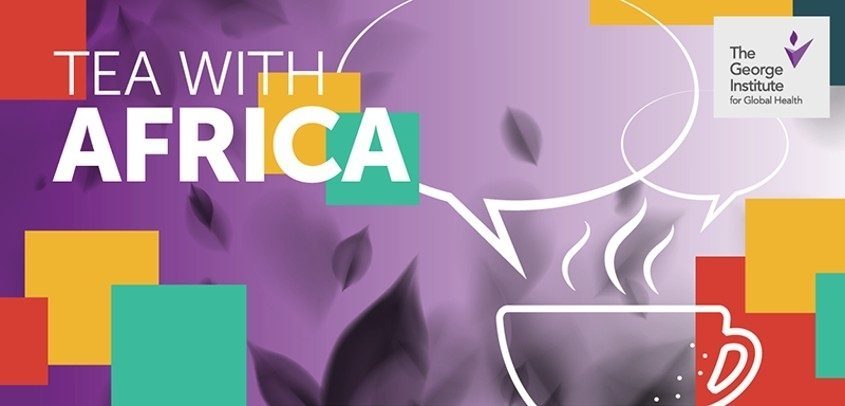
Blog: Key take outs and reflections from ‘Shaking it up: Salt reduction - what do we do next?’
A lot of progress has been made in Africa towards reducing deaths from communicable diseases, and there are opportunities to do same for non-communicable diseases. Staff and students at The George Institute for Global Health recognise the need for more authentic partnerships with researchers, communities, and institutions in Africa, and the ‘Tea with Africa’ series is part of building these connections.
On 23 March 2022, as part of its Africa Initiative, The George Institute for Global Health hosted the first ‘Tea with Africa’ as part of its Africa Initiative in the beginning of what we hope will be a series of events aimed at nurturing global health collaboration and providing an opportunity to showcase thought leadership and policy dialogues from/with experts from African countries.
Our panellists were drawn from Nigeria, China and Australia and attendees joined from countries all over the world. Panellists shared their perspectives on salt substitutes as an effective way to improve health.
Bruce Neal spoke first about what does and does not work in salt reduction, and why he is now focused on salt substitution. Bruce is a UK-trained physician who has 25 years’ experience in clinical, epidemiological, and public health research with a focus on heart disease, stroke and diabetes. Bruce Neal is Executive Director at The George Institute for Global Health, Australia; and Professor of Medicine, UNSW Sydney.
Dike Ojji spoke about salt reduction and prospects in the Nigerian context. Dike holds a PhD in Cardiovascular Medicine from the University of Cape Town, South Africa. He is a faculty at College of Health Sciences of University of Abuja and an Honorary Consultant Physician/Cardiologist, at University of Abuja Teaching Hospital, Gwagwalada, Abuja, Nigeria.
Clementina Ebere Okoro spoke about efforts in place for sodium reduction in Nigeria. Clementine is a Registered Dietitian-Nutritionist and has completed her Master of Science in Human Nutrition. She is the State Nutrition Coordinator in Federal Capital Territory Abuja and is also currently undertaking a PhD.
Xuejun Yin spoke about the Barriers and facilitators of salt substitute scale up. Xuejun has been involved in multiple research projects including the recent ground-breaking study on salt substitutes that shows how a simple salt swap can save millions of lives worldwide and is a PhD candidate at The George Institute China, working in the Food Policy team.
The session was chaired by Alta Schutte, Principal Theme Lead for Cardiac, Vascular and Metabolic Medicine in the Faculty of Medicine at UNSW Sydney; Professorial Fellow at The George Institute Australia; holds professorial appointments at North-West University and the University of the Witwatersrand in South Africa and is the Immediate Past-President of the International Society of Hypertension.
Key points
How is salt getting into your diet – and how can it be reduced?
There are three main ways to get salt (sodium) in your diet: processed foods, restaurant foods and discretionary salt – which is salt you add to your food at home. So, it follows there are three main ways to reduce salt in your diet. Working with food manufacturers to reduce the salt content in processed foods is one way. Other ways are by working with restaurant owners to reduce salt in their preparations and educating the community to add less salt at home.
Why focus on salt substitutes?
While there are occasional examples of success in working with food manufactures and restaurants and educating the community, overall, the effectiveness of these methods to reduce salt consumption has been minimal on a global scale. For most people in the world, salt added to food prepared at home is the main reason for excess sodium consumption. So, salt substitutes, which have lower sodium content and include potassium, provide a useful tool in lowering the amount of salt in peoples’ diets. The benefit of lower sodium and added potassium in your diet is lower blood pressure. Recently, a completed trial in China using salt substitutes showed they reduced risk of stroke, heart disease and premature death as blood pressure is reduced.
What is happening with salt reduction in Nigeria?
There are a range of activities underway to reduce the amount of salt consumed in Nigeria.
Currently, Nigeria falls in the bottom 20% of the global ranking of implementation of World Health Organisation best buys, but this will be changing soon. In 2019, Nigeria announced its Multisectoral Action Plan for NCDs which included a target to reduce sodium intake by at least 30% by 2025.
The first Nigeria sodium study to get a sense of salt consumption is currently underway. Involving stakeholder interviews, population surveys and food retail surveys, it is collecting information about labelling and sodium content in packaged foods, knowledge and attitudes around salt intake among stakeholders, and the general population, and feasibility of measures to reduce salt consumption, among other things.
A program involving nutritionist and dieticians across Nigeria is working on educational campaigns, increasing awareness in the population about the need for sodium reduction. There is also a government policy document underway that will guide public food procurement for schools and correctional facilities, which will focus on salt reduction in food.
What is the likelihood of success of sodium reduction strategies in Nigeria?
The prospect of successful sodium reduction in Nigeria is high. Interest from stakeholders including policy makers and regulatory bodies has exceeded expectations. This has been demonstrated by the number of people who attended the Nigeria Sodium Study major stakeholders’ meeting in November 2021 which was significantly greater than anticipated, an invitation to participate in Federal Government reformulation process, and enthusiasm expressed in response to policy documents and project updates.
What are the barriers and facilitators of salt substitute scale up?
There are clear evidence salt substitutes can lower blood pressure and reduce the risk of cardiovascular diseases, so it comes down to how this substitution can be implemented. Factors that can influence the effectiveness of scale up include availability, price, formulation, and taste.
Now salt substitutes are mostly available to purchase in high income countries, so perhaps the first facilitating step is encouraging salt companies to produce salt substitutes and make them available to purchase in all countries. Another challenge is that salt substitutes tend to be priced higher than regular salt, so another facilitating step would be working with governments to subsidise or manufactures to lower the cost of salt substitutes. A third challenge is the safety concern of the potassium in salt substitutes. Sodium chloride is mostly substituted with potassium chloride but sometimes also magnesium sulphate and other minerals. The potassium chloride has health benefits for most people but presents a risk for people who have severe kidney disease.
A multisectoral approach is required to influence the success of salt substitute scale up. Knowing these challenges helps us propose strategies to overcome barriers.
From the discussion
Q: How about those with heart conditions who can be susceptible to high potassium in their blood (hyperkalaemia) which if left untreated can lead to fatal abnormal heart rhythms (cardiac arrhythmias)? What do you think about this? was it studied in this aspect and on safety?
Answer from Bruce: Hyperkalemia is a theoretical risk but mostly only for people with very serious kidney disease. In our study in China we excluded people who were using potassium supplements or potassium sparing diuretics but use of ACE or ARB was allowed. We saw no increased risk of clinical hyperkalaemia or sudden death. And we saw protection against heart attack
Q: How about those with kidney conditions who usually require low sodium due to the impact on kidneys but also want to keep their potassium levels below 6mmol/L?
Answer from Bruce: People with kidney disease should of course eat less salt. There has been no large trial of salt substitute in people with kidney disease so hard to be sure how the balance of risks and benefits will play out. However, a recent modelling study assumed that the excess potassium in salt substitute would cause hyperkalaemia but that still, the BP lowering effect of salt substitute would more than outweigh any adverse effects, even in people with kidney disease. But the ideal for people with kidney disease is to stop eating salt - easier said than done though.
Q: Can you tell me whether the "home grown school feeding" program in Nigeria includes school food environment interventions such as the restriction of high fat, sugar and salt foods in school canteens and vendors in and around schools?
Answer from Clementine: Yes, absolutely. The Public food procurement policy is aimed at ensuring that foods procured for public consumption is nutritious, low in sodium, trans fats and sugar.
Q: Do salt substitutes change the flavour?
Answer from Bruce: Salt substitute tastes about the same if you have a 75%:25% NaCl:KCl ratio and similar granule size for the NaCl and KCl. More potassium can cause some taste difference though there are ways to control that using other additives. In general, it is well tolerated. KCl tastes salty in itself.
Q: How will you describe the population's access to nutritionists and dieticians, and how might this access support sodium intake reduction in the Nigeria?
Answer from Clementine: We are looking at more than just the number of Dietitians to population, that's why we want to make it a policy issues which will be binding on everyone. We are also pushing to ensure that manufacturers comply to this reduction.
Q: Salt substitute/reduction will also require engagement with industry. What will be your recommendation to the Nigerian government on implementing a salt reduction/substitute policy?
Answer from Dike: Involving the industry is very important. In our last stakeholders’ meeting they were a major group we engaged. We have also gone ahead to involve the Manufacturers’ Association. One way to go is to involve them from inception like we are doing so they are not taken aback when the policies come. If they are part of the policy formulations, buy in from them will be much easier.
Q: Is the effects of salt substitute in China likely to be achieved in other countries like Nigeria?
Answer from Bruce: The large SSaSS trial we did was in a very selected population. However, the benefits were almost certainly driven by BP lowering. We showed that BP lowering, and risk reduction was similar in all subgroups in SSaSS. Also, we know from 20 other trials of salt substitute that it lowers BP in every population group it has been tried in. So, I think the result is likely to be widely generalisable in terms of the RELATIVE effects. Clearly, absolute benefits will vary a lot depending upon the risk of the population.
Comment: In my opinion we should try to create evidence that using salt substitutes in the African population works, and I think that will be much easier than in China knowing the salt sensitivity that exist in the African populations. Dike and group of other researchers are organised to conduct this study. And we need to do it. I would propose that we move forward and organize this trial.
Response from Dike: I completely agree. We need the data to drive policies.
Comment: One barrier in the current discourse would be to overcome the claim for a need for outcome trials before extending to general populations. The SSaSS trial seems to suggest that the effects are due to a reduction in Na/K ratio where K increase is dominant compared to Na reduction. Would you move the discourse from sodium (salt)reduction to reduction in Na/K ratio in population changing the indicators for success?
Response from Bruce: Yes, I think that’s the right approach. We have been talking about this as a salt substitute effect not a salt reduction effect. We are presently doing some analyses to try and quantify the sodium versus potassium effects as well as how much of dietary salt we actually replaced with salt substitute in the China study.






